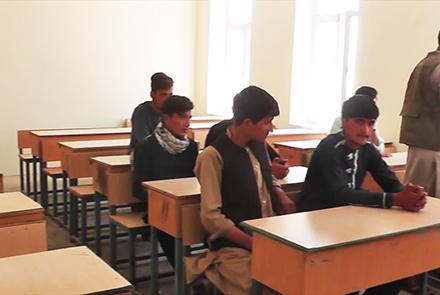Weeks after a devastating coordinated attack by the Taliban on Ghazni city, which killed and wounded hundreds of civilians and security force members, students in the city and across the province continue to live in fear and refuse to go to school.
According to Ghazni education department, over 30 percent of students, 20 percent of them girls, are not willing to attend classes following the Taliban attack on the city in August.
Fear of security threats, the migration of families from Ghazni city and the deployment of security forces inside school buildings are apparently among the key factors stopping students from going to school.
“The governor was also told that in this area there is the presence of armed opponents and the security forces, the police chief and all other responsible officials are also aware of that; recently I met with the honorable governor about this issue, he pledged that the forces will be deployed from certain areas to other places,” said Mohiburrahman Ansar, head of Ghazni education department.
“There is no doubt that the security situation has deteriorated, the students are not attending school because of security threats, sometimes routes are blocked, I think the quality of education is good, but the main issue is insecurity,” said Abdul Bari Shelgarai, a member of Ghazni provincial council.
Meanwhile, Ghazni police chief Fareed Ahmad Mashal has stressed the need for more comprehensive security measures to protect the city from threats.
The attack on Ghazni city continues to raise skepticism and concerns even on an international level.
Earlier this week Syed Akbaruddin, the Indian permanent representative to the United Nations said that there is no military solution to the conflict in Afghanistan.
“Mr. President, all of you know and believe that there is no military solution to the issue, yet the Taliban aided by their supporters continue to pursue military operations, perpetrating violence and destruction like the recent attack in Ghazni and in several parts of Afghanistan. These offensives are planned and launched by those who are harbored and given safe havens in the neighborhood of Afghanistan. These sanctuaries have for years provided safety for the dark agendas of ideologically and operationally fused terror networks like the Taliban, the Haqqani network, Daesh, al-Qaeda and its prescribed affiliate such as the Lashkar-e-Taiba and Jaish-e-Mohammed,” he said.
Residents in Ghazni have said that government failed to deliver on its promises it made to the people of Ghazni.
In August, hundreds of Taliban fighters stormed the city and engaged in heavy clashes with security forces for days.
Ghazni police later said Taliban fighters caused a lot of damage after using a civilian house in the area as a stronghold. The house was eventually destroyed in an airstrike in order to eliminate the militants.


